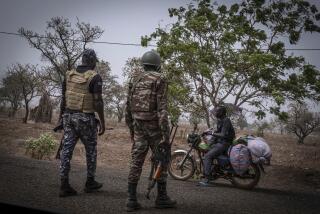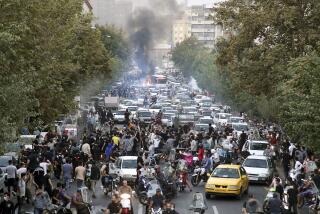Radical Shiite cults draw concern in southern Iraq
- Share via
NAJAF, IRAQ — Security official Abu Ali has reviewed hundreds of documents about the obscure messianic cult that incited deadly clashes last weekend at the height of Shiite Islam’s most important holiday.
The group, Abu Ali and other security and government officials say, wants to spark a war among Shiite Muslims.
Officials said the so-called Supporters of the Mahdi disrupted Shiite worshipers last weekend in Basra and Nasiriya and fought security forces, leaving as many as 80 people dead. In similar battles in January 2007, hundreds of members of another cult, Heaven’s Army, were killed.
Najaf province spokesman Ahmed Daaibil accused such groups of being terrorists whose aim is “to assassinate the clerics to shake security, stability and the political status of the government.”
The extremists are not associated with Al Qaeda, but are a “real source of threat to the stability in southern Iraq,” said military spokesman Army Maj. Gen. Kevin Bergner.
All week, police and soldiers have treated the Supporters of the Mahdi as dangerous criminals, raiding homes in Basra and Nasiriya. More than 250 suspects have been held.
Police closed a border crossing and detained at least seven suspects headed to Iran. Stockpiles of ammunition, weapons and explosives also have been confiscated.
Authorities are also examining the group’s website, which claims responsibility for the assassination of the Babil police chief, the bombing of a shrine and other violent acts.
The group’s bimonthly newspaper, the Straight Path, expresses messianic beliefs and suggests that Mahdi supporters must rise up and “kill the enemies of God until God is pleased,” according to an article in the Sept. 27 issue.
The Supporters of the Mahdi group is named after a figure Muslims believe will appear with Jesus to establish peace. Most Shiites believe the Mahdi is their 12th imam and a descendant of the prophet Muhammad who they say went into hiding in 878 and will return. Some cults believe they can hasten his return by spreading chaos.
A 48-year-old Shiite who lives in Zubair, south of Basra, said Supporters of the Mahdi tried to recruit him twice, in 2001 and 2004. The second time, the group had more financial backing, he said.
“I was surprised when this group changed to an armed group and fought the security forces,” said the man, who asked that his name not be used because he feared for his safety. “Now I realize I was on the right track when I refused to join them.”
Abu Tabarak, who lives in Basra, said he knows members of Supporters of the Mahdi and believes most are ethical, but close-minded. He said the group probably lost potential followers by sparking death and mayhem on Ashura, when Shiites mourn a key saint.
Experts who study politics and religion in southern Iraq said the emergence of such groups underscores the struggle for power among the Shiites.
If a Shiite leader such as radical cleric Muqtada Sadr somehow lost power, the door could open for these splinter groups, said Vali Nasr, a professor of international politics and Iraq expert at Tufts University.
“They’re operating on the fringes and trying to elbow their way in,” Nasr said. “Nobody is interested in giving them the economic means or allowing them to wreak havoc.”
Reidar Visser, a historian and Iraq expert who edits the website historiae.org, said he believes the government is overreacting to a small minority group. So far, there has been no decisive proof that Mahdists have risen in revolt, he said.
“Shiism in Iraq is a very complex religion, with many branches,” he said. It would make sense that the main political parties and conservative religious leaders “are worried about any challenge to their dominant position.”
Abu Zainab Kanaani, leader of the Basra branch of the Supreme Islamic Iraqi Council, the leading Shiite party, said Supporters of the Mahdi does not pose a threat to Iraqi political leadership.
“This is a terrorist group,” Kanaani said. “Their ideas and creed are far from the Iraqi reality and the Iraqi society.”
On Al Arabiya TV on Friday, secular Shiite lawmaker Iyad Jamaluddin said the government should be careful how it characterizes the group.
“The Iraqi Constitution ensures the freedom of thoughts and expression, and it’s not the government’s right to describe [the group] as blasphemous,” he said. “Even Al Qaeda has not been described as this.”
--
--
Special correspondent Fakhrildeen reported from Najaf and Times staff writer Yoshino from Baghdad. Times staff writers Saif Hameed and Tina Susman in Baghdad contributed to this report.
More to Read
Sign up for Essential California
The most important California stories and recommendations in your inbox every morning.
You may occasionally receive promotional content from the Los Angeles Times.














